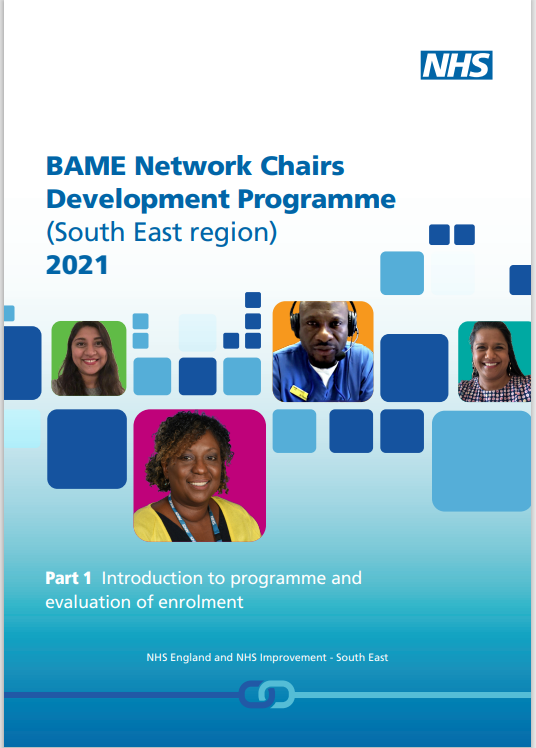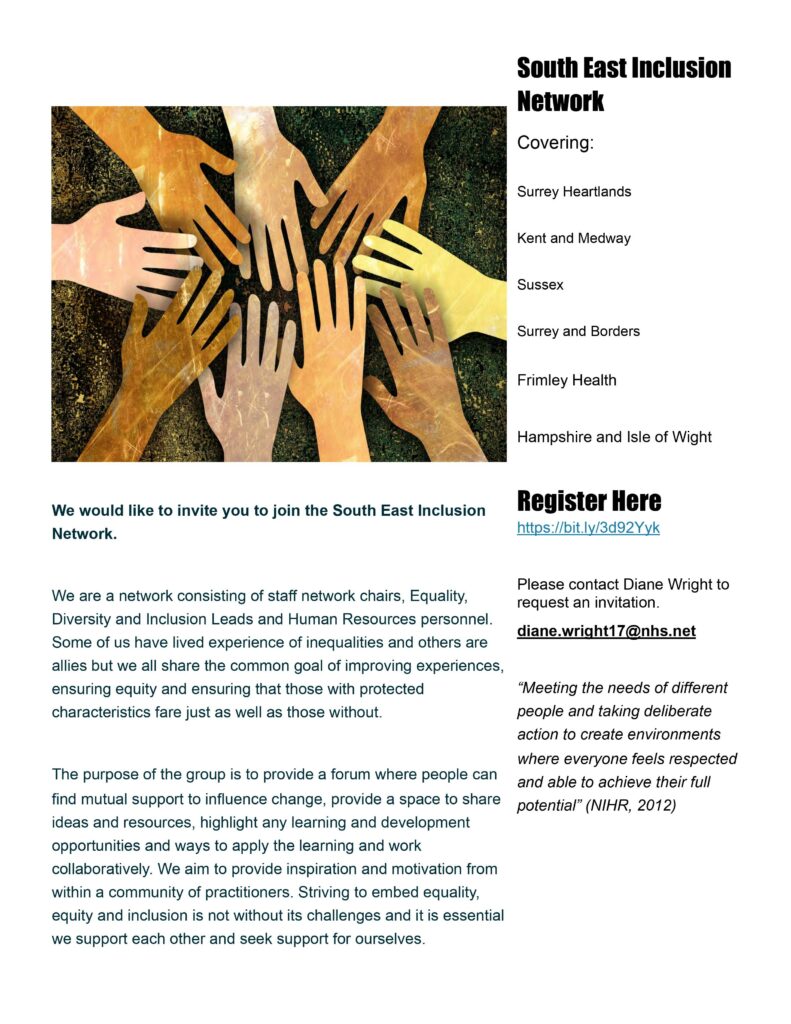Staff networks
BAME Network Chairs Development Programme
The Black, Asian and Minority Ethnic (BAME) Staff Network Chairs Development Programme aims to improve individual, workforce and organisational BAME experience. The programme was launched on 27/01/2021, has core staff involved in evaluation, implementation and programme management.
This is the first programme of its kind launched in the South East funded by NHS England. It is aligned with the aspirations of the Workforce Race Equality Standard (WRES), NHS leadership development and staff retention.
The programme is delivered in six sessions with scope for additional sessions if need has been identified. The programme will be evaluated at all stages to measure efficacy, support continuous improvement and inform future network development programmes.
- Introduction to programme and evaluation of enrolement
- Qualitative feedback from BAME network-chairs
- NHS BAME Network Chairs in England
LGBTQ+ Network Chairs Programme
- Download the South East LGBTQ+ Staff Survey Network Report 2021
- Download the South East LGBTQ+ Staff survey 2021
South East Inclusion Network
We are a network consisting of staff network chairs, Equality, Diversity and Inclusion Leads and Human Resources personnel. Some of us have lived experience of inequalities and others are allies but we all share the common goal of improving experiences, ensuring equity and ensuring that those with protected characteristics fare just as well as those without.
The purpose of the group is to provide a forum where people can find mutual support to influence change, provide a space to share ideas and resources, highlight any learning and development opportunities and ways to apply the learning and work collaboratively.
We aim to provide inspiration and motivation from within a community of practitioners. Striving to embed equality, equity and inclusion is not without its challenges and it is essential we support each other and seek support for ourselves.
Covering:
- Surrey Heartlands
- Kent and Medway
- Sussex
- Surrey and Borders
- Frimley Health
- Hampshire and Isle of Wight
For further information contact Diane Wright: diane.wright17@nhs.net
Disability Network Chairs Development Programme
In over 1.3 million NHS workers, only about four per cent declare their disability status on the Electronic Staff Record (ESR), but a twenty-one per cent data gap is filled by the ‘unknown’ and ‘not disclosed’ categories (NHS Digital, 2021). Disability networks play a crucial role in cultural development of an organisation by creating an inclusive and diverse working environment that encourages visibility, respect and equity for staff with disabilities. The networks also provide a safe space for staff to find connections with each other, share experiences, and promote ways to raise and discuss concerns. However, organisational pressures, scarcity of resources, and a lack of dedicated time for network activities often become the barriers to the networks’ growth, and/or barriers to meaningful engagement from staff.
The Disability Network Chairs Development Programme (DNCDP) was launched in February 2021 by the South East Equality, Diversity and Inclusion (EDI) team. The DNCDP seeks to improve individual and organisational workforce experience for the Disability Network Leads by developing skills and impact in representing the voice of NHS staff with Disabilities in their respective organisations and systems.
The programme was initially delivered over three 3-hour sessions and was evaluated to measure its efficacy to support improvement and to inform future development of programmes in the South East.
The DNCDP programme continues to evolve, with a specific focus on expanding and delivering co-designed interventions.
The Disability Network Development Programme will continue with bespoke support from Cavita Chapman, Head of Equality, Diversity and Inclusion and Cristina LaCara MBACP Accr Psychodynamic Counsellor, Coach and Group Facilitator.
Click here for more information or contact Diane Wright: diane.wright17@nhs.net
Session plan – giving and receiving feedback |
If used thoughtfully and with intent, feedback and coaching will promote learning and growth as well as personal and professional development. Feedback plays a major role in building self-awareness in terms of knowledge, skills and attitude. |
Strategy Session |
A session focussed on developing network chairs’ confidence levels about influencing or developing a strategy, forming strategic relationships and understanding strategy within the landscape they work. |
WDES Network Chairs Report |
The Disability Network Chairs Development Programme seeks to develop the disability network leads’ confidence and skills in having a greater impact on representing the voice of NHS staff with disabilities in their respective organisations and systems. |
WDES Network Chairs Thematic Analysis |
Summary of Themes in Relation to the NHS and the Health and Wellbeing Needs of Staff with Disabilities
|


